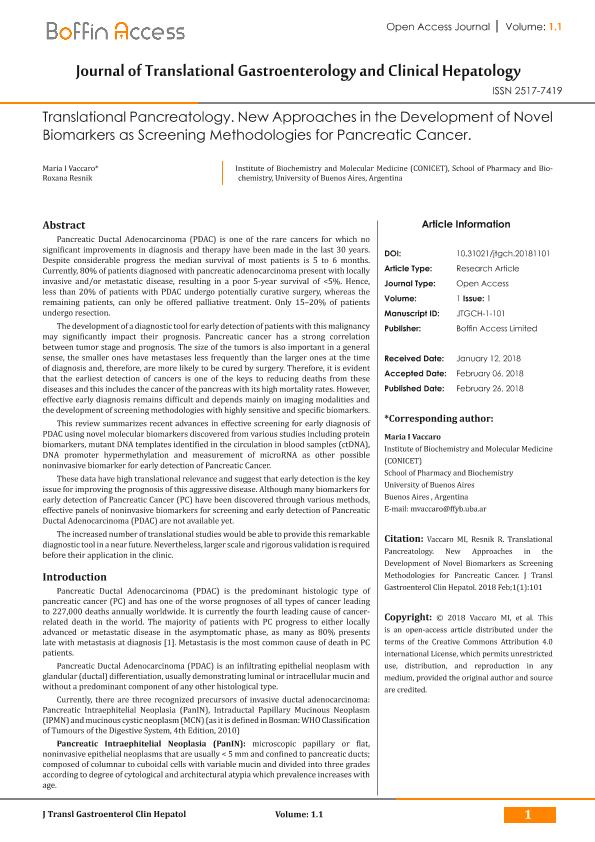Mostrar el registro sencillo del ítem
dc.contributor.author
Vaccaro, Maria Ines

dc.contributor.author
Resnik, Roxana
dc.date.available
2019-11-26T20:46:07Z
dc.date.issued
2018-02
dc.identifier.citation
Vaccaro, Maria Ines; Resnik, Roxana; Translational Pancreatology. New Approaches in the Development of Novel Biomarkers as Screening Methodologies for Pancreatic Cancer; Boffin Access; Journal of Translational Gastroenterology and Clinical Hepatology; 1; 1; 2-2018; 101-107
dc.identifier.issn
2517-7419
dc.identifier.uri
http://hdl.handle.net/11336/90577
dc.description.abstract
Pancreatic Ductal Adenocarcinoma (PDAC) is one of the rare cancers for which no significant improvements in diagnosis and therapy have been made in the last 30 years. Despite considerable progress the median survival of most patients is 5 to 6 months. Currently, 80% of patients diagnosed with pancreatic adenocarcinoma present with locally invasive and/or metastatic disease, resulting in a poor 5-year survival of <5%. Hence, less than 20% of patients with PDAC undergo potentially curative surgery, whereas the remaining patients, can only be offered palliative treatment. Only 15–20% of patients undergo resection. The development of a diagnostic tool for early detection of patients with this malignancy may significantly impact their prognosis. Pancreatic cancer has a strong correlation between tumor stage and prognosis. The size of the tumors is also important in a general sense, the smaller ones have metastases less frequently than the larger ones at the time of diagnosis and, therefore, are more likely to be cured by surgery. Therefore, it is evident that the earliest detection of cancers is one of the keys to reducing deaths from these diseases and this includes the cancer of the pancreas with its high mortality rates. However, effective early diagnosis remains difficult and depends mainly on imaging modalities and the development of screening methodologies with highly sensitive and specific biomarkers. This review summarizes recent advances in effective screening for early diagnosis of PDAC using novel molecular biomarkers discovered from various studies including protein biomarkers, mutant DNA templates identified in the circulation in blood samples (ctDNA), DNA promoter hypermethylation and measurement of microRNA as other possible noninvasive biomarker for early detection of Pancreatic Cancer. These data have high translational relevance and suggest that early detection is the key issue for improving the prognosis of this aggressive disease. Although many biomarkers for early detection of Pancreatic Cancer (PC) have been discovered through various methods, effective panels of noninvasive biomarkers for screening and early detection of Pancreatic Ductal Adenocarcinoma (PDAC) are not available yet. The increased number of translational studies would be able to provide this remarkable diagnostic tool in a near future. Nevertheless, larger scale and rigorous validation is required before their application in the clinic. ofPDAC using novel molecular biomarkers discovered from various studies including proteinbiomarkers, mutant DNA templates identified in the circulation in blood samples (ctDNA),DNA promoter hypermethylation and measurement of microRNA as other possiblenoninvasive biomarker for early detection of Pancreatic Cancer.These data have high translational relevance and suggest that early detection is the keyissue for improving the prognosis of this aggressive disease. Although many biomarkers forearly detection of Pancreatic Cancer (PC) have been discovered through various methods,effective panels of noninvasive biomarkers for screening and early detection of PancreaticDuctal Adenocarcinoma (PDAC) are not available yet.The increased number of translational studies would be able to provide this remarkablediagnostic tool in a near future. Nevertheless,
dc.format
application/pdf
dc.language.iso
eng
dc.publisher
Boffin Access
dc.rights
info:eu-repo/semantics/openAccess
dc.rights.uri
https://creativecommons.org/licenses/by/2.5/ar/
dc.subject
Traslacional
dc.subject
Pancreatic Cancer
dc.subject
Biomarkers
dc.subject
Screening texts
dc.subject.classification
Bioquímica y Biología Molecular

dc.subject.classification
Medicina Básica

dc.subject.classification
CIENCIAS MÉDICAS Y DE LA SALUD

dc.title
Translational Pancreatology. New Approaches in the Development of Novel Biomarkers as Screening Methodologies for Pancreatic Cancer
dc.type
info:eu-repo/semantics/article
dc.type
info:ar-repo/semantics/artículo
dc.type
info:eu-repo/semantics/publishedVersion
dc.date.updated
2019-10-23T20:59:55Z
dc.journal.volume
1
dc.journal.number
1
dc.journal.pagination
101-107
dc.journal.pais
Reino Unido

dc.journal.ciudad
Londres
dc.description.fil
Fil: Vaccaro, Maria Ines. Consejo Nacional de Investigaciones Científicas y Técnicas. Oficina de Coordinación Administrativa Houssay. Instituto de Bioquímica y Medicina Molecular. Universidad de Buenos Aires. Facultad Medicina. Instituto de Bioquímica y Medicina Molecular; Argentina
dc.description.fil
Fil: Resnik, Roxana. Consejo Nacional de Investigaciones Científicas y Técnicas. Oficina de Coordinación Administrativa Houssay. Instituto de Bioquímica y Medicina Molecular. Universidad de Buenos Aires. Facultad Medicina. Instituto de Bioquímica y Medicina Molecular; Argentina
dc.journal.title
Journal of Translational Gastroenterology and Clinical Hepatology
dc.relation.alternativeid
info:eu-repo/semantics/altIdentifier/doi/https://doi.org/10.31021/jtgch.20181101
dc.relation.alternativeid
info:eu-repo/semantics/altIdentifier/url/https://www.boffinaccess.com/open-access-journals/translational-gastroenterology-and-clinical-hepatology/translational-pancreatology-jtgch-1-101.php
Archivos asociados
